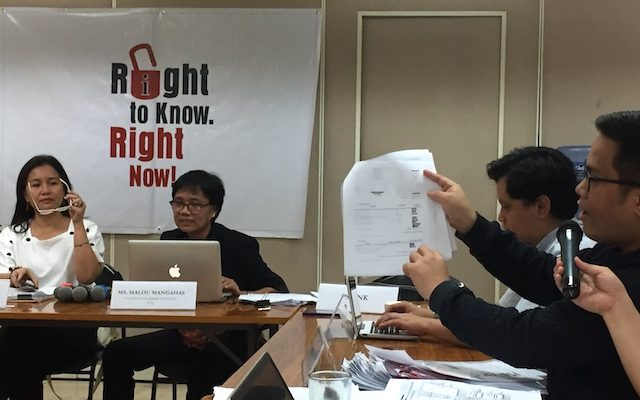SUMMARY
This is AI generated summarization, which may have errors. For context, always refer to the full article.

MANILA, Philippines – The Duterte administration trumpets freedom of information (FOI) in the executive branch, but the latest statements of assets, liabilities and net worth (SALN) of Cabinet officials it made available to the media contradicted that.
In a series of stories published on Friday, September 22, the Philippine Center for Investigative Journalism (PCIJ) reported that significant redactions were made in the copies of SALNs filed in December 2016 by Cabinet members under President Rodrigo Duterte.
The redactions in SALNs released to the media are in the form of black lines shading or covering relevant information.
“The epidemic of redactions, we think, would mock the FOI [executive order]. It will be a deal-breaker for all of us,” said PCIJ editor-in-chief Malou Mangahas in a public forum on Friday organized by the Right to Know Right Now Coalition. PCIJ is a co-convenor of the coalition.
President Duterte in July 2016 signed Executive Order Number 2, rolling out FOI in the executive branch, opening up government agencies to data requests from citizens.
PCIJ and business news website Entrepreneur Philippines noted that a lot of information have been redacted in the copies of Cabinet members’ annual SALNs filed in December 2016. They obtained these SALNs from the Malacañang Records Office upon request.
For instance, 28 of the 29 SALNs received by Entrepreneur Philippines “had the acquisition costs or amounts of personal properties blacked out.” Meanwhile, in 24 SALNs, “the exact locations of real properties were redacted,” and in 23 SALNs, its corresponding acquisition costs were likewise shaded.
In a fresh batch of 46 SALNs that PCIJ received, there were still redactions, but these “were kept within a 5-item list” namely:
- Filer’s address
- Name, date of birth, and age of unmarried minor children
- Exact location of real properties
- ID number of filer and/or spouse
- Signature of filer and/or spouse
In President Duterte’s December 2016 SALN, only his home address was redacted.
For comparison, the SALNs filed by Duterte Cabinet members in June 2016 and later obtained by the media – including Rappler – had little to no redactions. If there were any, only the home address was withheld.
The PCIJ pointed to Civil Service Commission (CSC) guidelines, which allow only one information that may be redacted when a 3rd party requests a government official’s SALN: the address of the declarant.
Privacy versus transparency
In PCIJ’s story, when asked for the first time in August for the reason for the redactions, Presidential Communications Operations Office (PCOO) Assistant Secretary Kris Ablan explained that “informal rules were outlined” by the clearinghouse of the Office of the President (OP).
Ablan added, “News reports about the relatives of [PCOO] Secretary Martin Andanar triggered it.”
“We are not trying to hide anything,” insisted Ablan in PCIJ’s story. “The concern of [the] committee is we have to protect [the] privacy of our principals.”
PCIJ noted that Andanar had the most redacted parts in the batch of December 2016 SALNs received by Entrepreneur Philippines, with 10 details blacked out. Andanar was also among the Cabinet officials with the most redactions in PCIJ’s batch of SALN copies, with 5.
But the PCIJ clarified on Friday that the number of redactions depend on the information declared by the Cabinet officials, like whether or not they would have to declare children under the age of 18.
Mangahas emphasized that the SALN is a “bellwether document for transparency and accountability in the public sector.” She noted that SALNs have figured in the impeachment of many top officials in the past and in recent moves to impeach incumbent officials.
She argued that in the matter of SALN disclosures, Republic Act 6713 or the Code of Conduct and Ethical Standards for Public Officials and Employees should be the reference, not the Data Privacy Act.
“It would be important to respect the Data Privacy Act…but we have asked them to consider that the Data Privacy Act doesn’t include people in government,” be it current or former ones, “when it comes to their functions and responsibilities,” she explained.
The implementing rules of the Data Privacy Act, said Mangahas, also concedes to the media some special-case situations. “If we do our work as reporters because it’s in the public good that this data should come out, we should be allowed to get data.” (RELATED: NPC reminds media: Balance freedom of press, right to privacy)
Mangahas added, “We are sensing that some data privacy officers are so ‘spooked’ by the threat of huge penalties if they would commit…a breach of privacy rights.”
Nonetheless, she said that the PCIJ had raised these issues in a series of meetings with the PCOO and the OP clearinghouse. – Rappler.com
Add a comment
How does this make you feel?
There are no comments yet. Add your comment to start the conversation.